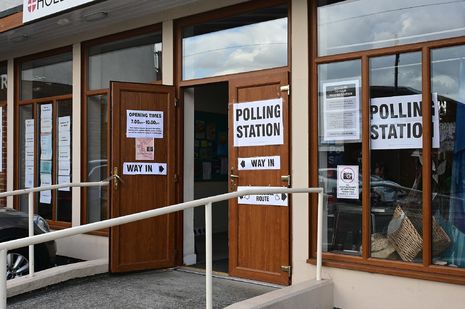Young people don’t like your online political campaigns
Nessa Yip argues that politicians’ attempts to pander to the young electorate through social media are working against them

Throughout its history, political campaigning has had to evolve alongside different forms of media for its survival. But watching politics attempt to navigate social media, especially during the lead-up to the 2024 general election, has felt worryingly similar to watching myself accidentally get recruited into the rounders team at school.
Political parties have poured millions into establishing a social media presence that delivers snarky jabs at rivals, trading substance and policy for vapid giggles, in an attempt to engage younger voters, or more generally, the majority of the electorate that is active on social media. Who would’ve thought memes and videos like ‘pov: you’re being shipped off to war by Rishi Sunak’ would become one of the largest tools parties consistently employ to win votes?
“I hope to see parties move away from their strategy of connection through a cheap laugh”
Don’t get me wrong, I love when traditionally serious institutions show their playful sides – but in the right contexts. TikToks of porters introducing their colleges in endearingly fluent Gen Z jargon? Give me ten more. There’s a time and place, and deploying sardonic memes chock-full of ad hominem attacks in the political arena only serves to undermine the gravity of politics. Something whose influence can be felt by millions of livelihoods demands to be met with respect.
I agree with the effort to engage younger voters, and can understand why parties have turned to social media as a means of engaging those perceived to be more ‘politically apathetic’. 14 years of Conservative governments left holes so big you could mistake them for Swiss cheese, leaving parties with much to criticise in their 2024 campaigns, which they rightly took advantage of. But even after Labour’s landslide majority, their online campaign strategy has remained frustratingly invariant: thin on policy-based and well-thought-out, informative content, heavy on Gen Z-pandering laughs. And I’m sure I’m not the only Gen Z that recognises the ineffectiveness and, honestly, feels second-hand embarrassment from their one-trick-pony campaigning. The language is out of touch, reads like a Gen Z impersonation and feels painfully similar to walking through Sidgwick in an outfit I hoped not to be perceived in. Imagine if all the political societies at Cambridge followed suit and bombarded us with an onslaught of rival-dissing content. We’d probably all get exasperated, at least after a while.
And it seems they won’t change tack for a while – the Labour Growth Group (LGG), a backbench pressure group made of over 100 MPs, urged for more MPs to work with podcasters, YouTubers and the like, pursuing a more ‘influencer’-based strategy to swim with the political current. While I see the need to adapt to stay afloat with the content-spitting, football shirt-signing Farage, parties, especially Labour, ought to rethink their current strategy before diving headfirst into the online ecosystem. Their “nothing sells like negativity” attitude is currently executed in an almost petulant fashion, and with social media being deemed “new-age door-knocking” by some, their online campaign is likely doing more harm than good, and flies in the face of their principle of “[making] legitimate criticisms based on policy and political actions, never making personal attacks”. I can be open-minded to attempts to innovate with online campaigns, but there now seems to be a disconnect between Labour’s campaign strategy, and an increasingly disgruntled subset of Labour supporters.
“Deploying sardonic memes chock-full of ad hominem attacks in the political arena only serves to undermine the gravity of politics”
Part of the restless vying for online attention is driven by the looming threat of Reform. Parties, especially Labour, are ceaselessly buying more ads and churning out more content to dissuade the Reform-curious. I sense a massive danger here in the lead-up to the next general election. Labour’s fickle, undermining online attitude has the potential to, if not already, lose current supporters.
While it seems hyperbolic to ascribe so much responsibility towards their unstrategic social media presence, unfortunately, social media now has a large sway over the political climate. Labour needs a wake-up call (and honestly some media training) if it is to retain any dignity against Reform in the pervasive online space. What we are witnessing online always brings to mind an image of the House of Commons erupting into chaos, with Bercow straining his voice over the clamours of the disgruntled. Labour needs to deliver sensible policy-backed content, which is being achieved in an incredible way by some podcasters and YouTubers who deliver political tidbits and/or analyses in an accessible way. It just goes to show, you can sensibly engage those active on social media in politics without compromising your dignity.
I worry for the upcoming years until the next general election, and I hope to see parties move away from their strategy of connection through a cheap laugh. What aimed to foster connection to the younger electorate has ended up distancing us. There are better ways of demonstrating authenticity, of ‘speaking the people’s language’ and adding a human touch to their campaigns. But, disappointingly, what we are seeing now on our phones seems to be a page taken out of a child’s playbook.
 News / Colleges charge different rents for the same Castle Street accommodation2 March 2026
News / Colleges charge different rents for the same Castle Street accommodation2 March 2026 News / News in Brief: waterworks, wine woes, and workplace wins 1 March 2026
News / News in Brief: waterworks, wine woes, and workplace wins 1 March 2026 News / Climate activists protest for ‘ethical careers policy’1 March 2026
News / Climate activists protest for ‘ethical careers policy’1 March 2026 News / Angela Merkel among Cambridge honorary degree nominees27 February 2026
News / Angela Merkel among Cambridge honorary degree nominees27 February 2026 News / Private school teacher who lied about Cambridge degree barred from teaching27 February 2026
News / Private school teacher who lied about Cambridge degree barred from teaching27 February 2026









